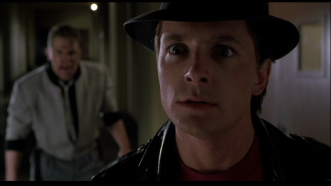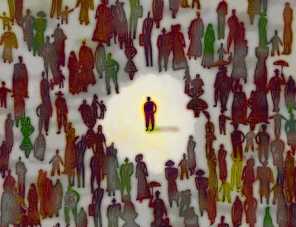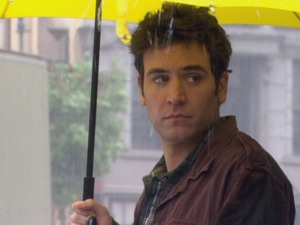Part 1: In the Now

As I mentioned in my post about Goal, Motivation, Conflict, character is the most rudimentary ingredient in fiction.
From the writing guide Revision & Self Editing by James Scott Bell, I’ll be hand selecting three fundamental considerations for every post in my Crafting a Character series. For the purpose of self-knowledge, you could also create a character sketch of yourself and dig into the following concepts to obtain a goldmine of introspection.
I am More Than Just an A/S/L!
The typical character sketch would include the age, sex, language, and other physical traits of a person. If you want to run deeper than a basic police profile, consider the following.
Point of Vulnerability:
Knowing your character’s point of vulnerability can vastly shape your entire story. Figure out what their personal pitfalls are, what triggers their frustration the most. It will be one of the greatest deciding factors in what they will react to and how.

From Back to the Future, Marty McFly’s point of vulnerability is his sense of courage. No matter what era Marty finds himself in throughout the epic trilogy, he often walks away from a challenge until Biff Tannen (or his ancestor) asks, “what’s the matter, [are] you chicken?”
Our spunky, time traveling hero turns around and responds with “nobody calls me chicken!” This point of vulnerability causes Marty to never backdown to almost every challenge presented by this long running lineage of bullies. It often gets him into more trouble as opposed to escaping it.
At the end of the epic trilogy, Marty learns to feel secure with his integrity, thus knowing when to back down from a needless challenge. Although this test of bravery had served him well for the first half of the series, this point of vulnerability and how he deals with it is revealed for what it is; an ego trip designed to make him feel brave, while costing him progression toward his more important goals.
What’s your point of vulnerability? What kinds of challenges do you receive relevant to it, and how do you react to them?
Physical appearance and how they feel about it:
 Physical appearance only describes how a person looks, but what’s more important than this basic fact is how they feel about it.
Physical appearance only describes how a person looks, but what’s more important than this basic fact is how they feel about it.
In Skinny by Donna Cooner, an obese high school senior named Ever is tormented by the whisperings of “Skinny,” a voice in her head who constantly berates her about her weight.
When Ever breaks the chair she’s sitting on at a school assembly, she decides that enough is enough. She goes under gastral bypass surgery to help control her food intake, as well as start an exercice regimen that helps her expand her self confidence by shrinking her waistline.
Even people of average or beyond average attractiveness can have issues with their physical appearance. (For the sake of argument, let’s just say there is an objective standard for beauty, even though it’s usually in the eye of the beholder.)
For instance; Perfect by Natasha Friend features a dynamic duo of 13 year old girls that have bulimia. Since the death of her father, the protagonist Isabelle developed the habit of binging on a ton of food and purging it right out.
Isabelle joins a bulimia outreach group where she is surprised to find Ashley Barnum there, the popular and pretty girl at school. She is shocked to discover that the girl she once revered as picture perfect also has body issues, even though both girls are actually skinny. In fact, if Ever encountered these girls, she’d be repulsed by their skinniness and eating disorder.
How do you feel about your physical appearance? Have you updated your wardrobe extensively, started working out, or are you simply secure with it? What role has it played in your life?
What Others Think:

The old addage, “you shouldn’t care too much about what others think,” is coupled with the cliche of “it’s easier said than done.” To some degree, we all concern ourselves with how others perceive us, whether extensively or minimally.
The Evolution of Bruno Little More by Benjamin Hale follows the story of the world’s first English speaking chimpanzee. In Bruno’s memoir, he details his struggles between civilizing himself among humanity and keeping true to his primitive roots.
The more self aware he becomes, the more he begins to worry about how others perceive him. Since a ridiculous standard is forced upon him, being the first talking chimp and all, it becomes increasingly difficult to contain his baser urges while maintaing the eloquent and intelligent personality he has developed since acquiring language.
When our self perception clashes with what others think of us, it creates a divide between staying true to ourselves or conforming to the crowd–or in some masterfully crafted instances, finding a middle ground.
How much do you concern yourself with external opinions? Has it caused you to change your behaviour or have you developed any habits that help ward off the temptation to please others?
Part 2: It’s All in the Past

In the previous installment of the Crafting a Character series, we took a look at how characters think and behave in the present. What usually shapes those behaviours and attitudes is their past.
Backstory is the cornerstone of all character development because it’s in the past where almost the entire identity of a person is formed. Whether you’re creating the backstory of a character, or looking at your own history, the past has a ton of answers for your questions about the present and the future.
Why Can’t You Just Let It Go?
Main Shaping and Influencing Incidents:
Usually in childhood, but not always, we’ve all had significant moments in our lives where our views of the world and of ourselves were changed forever. These incidents range from being tragic, comical, or inspiring. Either way, discovering the life changing events in your own life, or creating one for your character, can drastically improve your understanding of what may drive a person to behave the way they do in the present.

In a classic episode of The Simpsons, the family wants to go on vacation, but when their plane is about to take off, the family learns that Marge has a fear of flying. “Let me off the plane,” she says and then starts pacing down the aisle back and forth.
“Let me off! Let me off! Let me off!”
Marge starts going to therapy and at the end of the episode, she uncovers childhood memories she must have locked away for years.
She recalls thinking that her father was a pilot, and child Marge follows him into a plane to find out that he was a stewardess–which was a rare occupation for men in the 60’s–and the embarassment of her father working a woman’s job apparently traumatizes her into having a fear of flying.
There were a few more adverse memories she recalled, and those were the ones that seemed more logical in explaining why she had the fear, but I won’t go into detail about them here. Just watch the episode, it’s hilarious!
Can you recall any traumatic events that have fundamentally wounded you for life? Or do you have any memories of being significantly inspired by someone that motivate you to this day? How have any of these influencing incidents impacted the way you behave in your present life?
Relationship With the Family:
Your family is your first experience of what it’s like to be in a social circle, particularly in your formative years. The way you relate and interact with your extended family helps you develop the social skills (or lack thereof) that which you bring in to the rest of society, be it at school, post-secondary education, work, and the market place.
More importantly, your parents’ marriage vastly influences your ideas of love, marriage, and friendship. And depending on the bond you have with your parents–whether it’s strong, weak, or non existant–you’re automatically subjugated to either replicating or replacing your experience of them.

The nameless narrator in Fight Club by Chuck Palahniuk grew up, for the most part, without a father. So when he befriends the wise and witty renegade Tyler Duren, he looks up to him as a father figure.
When they start living together, Tyler gets into a sexual relationship with Marla Singer, a woman the nameless narrator met at a bunch of support groups. This becomes a recreation of the narrator’s childhood in that he never sees Tyler and Marla in the same room together, and becomes the middleman of their interactions–thus recreating his experience with his parents before they got divorced.
Furthermore, the underground Fight Club would not be possible had its members had their fathers around, or meaningful bonds with them if they were around for their childhoods. It’s well established among psychological circles that fatherlessness causes a variety of societal and psychological problems.
What template for romance have your parents imprinted for you? What relationship do you have with your extended family? How have these affected your mode of interaction with the rest of society?
Where They Grew Up:
From your country of origin, to your economic status growing up, and your childhood home, where you grew up also greatly defines how you’ll fit in to the rest of society.
 In West Philadelphia, born and raised, is where the Fresh Prince spent most of his days. But as you know by the title sequence theme song, he got in one little fight and his mom got scared, so he moved in with his uncle and auntie in Bel-Air.
In West Philadelphia, born and raised, is where the Fresh Prince spent most of his days. But as you know by the title sequence theme song, he got in one little fight and his mom got scared, so he moved in with his uncle and auntie in Bel-Air.
What made this sitcom so great was how Will Smith’s care free and eccentric hood mentality clashed with the prestigious and more “dignified” culture of upper class Los Angeles.
This made for an interesting conflict with Will trying to behave in a way that was acceptable to the culture, while also staying true to himself. Though, the funniest parts of Fresh Prince for me was when he was free to be himself around rich and pretigious people, and they welcomed him with open arms, thus showing that cultural division can be torn down if both parties are willing to be friendly.
Are your current living conditions different from how you grew up? If so, what has this contrast done for your sense of identity? If not, was it a conscious choice to remain comfortable with the familiar or do you intend on breaking the cultural barrier?
Part 3: A Better Tomorrow

We’ve taken a look at how our present lives are defined by our pasts, and to come full circle, we will delve into breaking the shackles of history and achieving freedom in the future.
As always, characters are driven by Goal, Motivation, and Conflict. All three keys play an important part into unlocking the potential that resides in all of us, fictional and real people alike. Here is how GMC is considered in a character profile:
The First Day of the Rest of Your Life
Main Desire:
Desires drive all action, purpose, and intention. Having a clear understanding of your desires is fundamental to understanding what steps you need to take toward leading a fulfilling life, as well as providing value to the rest of the world.
Even if your initial desire is what propels you into action, the desire may change over time or evolve to something else based on how much you want to achieve. Sometimes you do get what you want and realize you desire so much more than you ever realized.
 Such is the case for Morgan from #16Things I Thought Were True by Janet Gurtler. After her mother suffers a heart attack, Morgan gathers the courage and tenacity to ask about the biological father that was absent throughout her childhood.
Such is the case for Morgan from #16Things I Thought Were True by Janet Gurtler. After her mother suffers a heart attack, Morgan gathers the courage and tenacity to ask about the biological father that was absent throughout her childhood.
At the start of the story, Morgan sets out to gain 5000 Twitter followers, while having 0 friends in the physical world because she feels alienated after having an embarassing video of her dancing in boy’s underwear going viral.
Due to certain circumstances, Morgan is forced to allow two of her co-workers, Adam and Amy, to accompany her on a road trip to seek out her biological father.
Although confronting him is her initial desire (as well as amassing a ton of Twitter followers), Morgan develops a bond with Adam and Amy; two co-workers she had barely liked or understood at a personal level before their heart warming–and sometimes gut wrenching–road trip together. Her true desire all along had been garnering connectivity, and it didn’t have to come from her long lost father.
What are your main desires? Have you achieved them only to realize there was something more meaningful out there? What steps are you taking today in order to achieve these goals in the future?
Major Strength:
Another important aspect of characterization is having strengths that contrast a character’s vulnerabilities. Many protagonists are victims of circumstance which drives us to sympathize with them, but in order for us to even want to root for them, they need to have major strengths that can help make them more appealing.

In the hit series How I Met Your Mother, Ted Mosby goes on a seemingly unending search for his soul mate. He starts off as a desperate lovelorn who just can’t catch a break because his desire often becomes a part of his major flaws. Having this desire starts off as a way to avoid himself and have him develop the mentality that he is nothing without somebody to love.
However, throughout the course of this dramatic rom-com, we learn that he has a big heart and he’s deeply invested in his friends. The love that he provides for them transforms into love for himself and discovering his own value as an individual before meeting The Mother/Tracy McConnell.
Ted Mosby’s strength is his ability to love and his hopeful spirit, but it took transmuting it for himself and for what he already had in order to achieve his goal; meeting a woman who more or less resembles a combination of all his friends.
What are your major strengths? How do they play a role in helping you achieve your desires?
Perpetual Passion and Main Mission:
The mark of a strong character is intertwining their personal desires with their major strength in order to contribute something to the world at large. People who want to make a difference in the world, or at least in their immediate world (interpersonal relationships), are always challenged by people who want to keep things the same and not improve the state of the world.
Having a mission and commiting to it is admirable because it’s the ultimate test of character to offer your gift to the world, despite of its initial reluctance to accept it–when ironically, the world may so desperately be in need of your gift.

Batman, despite all his violent brutality serves as a good example for a character rooted in their principles. He’s committed to fighting injustice, but will never ever kill criminals.
He believes anybody can be redeemed and sees the possible good in others all despite of the hatred he has for his parents’ murderer (which changes depending on which reiteration of the Batman story you read, watch, or play).
I could just as easily use a character who embodies the purist level of virtue, but I think Batman serves as the best example because he’s still fundamentally flawed being so addicted to enacting violence, and only stopping short of actual murder. It’s debatable whether or not he creates more villains than he puts away, but one thing is for sure: he is committed to his perpetual passion for fighting crime as his main mission.
What are you passionate about? What’s your main mission? What mark do you want to leave in the world and why do you think it’s important?

[…] Crafting a Character […]
[…] Crafting a Character […]
[…] Crafting a Character […]
[…] as well as relate to in terms of emotionality and intellectual stimulation. I’ve already made several posts about characters, and that very fact alone is reason enough to prove just how important it is to have solid […]
[…] Crafting a Character Series […]
[…] particularly, how you craft your characters so that they can become multi-mentional beings that pop out of the […]
[…] Crafting characters, as you know, is one of my favourite aspects of writing because without people there are no stories. It is through the characters that we get to relate to in navigating the human experience, and that’s why it’s important to make them as true to life as possible, no matter what the setting is or whatever other lifeform they take that isn’t exactly human. […]
[…] Crafting a Character […]
[…] Crafting a Character […]